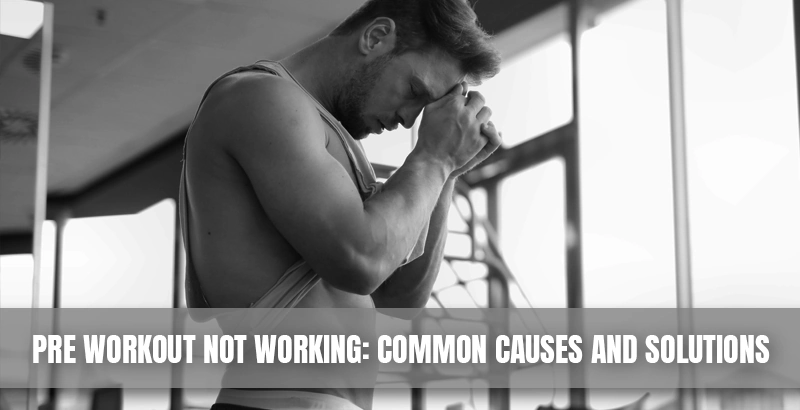
Have you ever experienced a lack of results from your pre-workout routine? Maybe you've been taking the same pre-workout supplement for months, but you're not feeling the energy or focus you once did. It can be frustrating to put in all that effort at the gym and not see the results you want. If you're feeling like your pre-workout isn't working, you're not alone. This is a common problem among fitness enthusiasts, and it can be caused by a number of factors.
In this post, we'll dive into the common reasons why pre-workout supplements may not be effective, and what you can do to fix it. We'll explore everything from the ingredients in your pre-workout, to your nutrition and hydration, to your sleep habits. By the end of this article, you'll have a better understanding of what may be causing your pre-workout to fall short, and how to optimize your routine to achieve the best results.
So, if you're ready to take your workout to the next level and make the most out of your pre-workout, keep reading to find out what you need to know.
One of the most common frustrations among fitness enthusiasts is a pre-workout supplement that fails to deliver results. Many people turn to pre-workout supplements for an extra boost of energy, focus, and endurance to power through their workouts. However, when a pre-workout fails to live up to its promises, it can be incredibly frustrating and demotivating.
Whether you're a seasoned athlete or just starting on your fitness journey, experiencing a lack of results from your pre-workout routine can be a major setback. Not only can it leave you feeling tired and unproductive during your workouts, but it can also impact your overall progress towards your fitness goals. Understanding the reasons why your pre-workout may not be working is the first step towards finding a solution and optimizing your routine for the best possible results.
Also read: Understanding Supplements: Why Does Pre Workout Make You Sweat More
One of the most common causes of pre-workout supplements not working is a problem with the ingredients. Not all pre-workouts are created equal, and the effectiveness of each supplement can vary depending on the ingredients it contains. Some pre-workouts may contain ineffective or low-quality ingredients, while others may have ingredients that your body simply doesn't respond well to.
To ensure that your pre-workout is effective, it's important to choose a supplement with high-quality ingredients that are backed by scientific research. Look for ingredients such as caffeine, beta-alanine, and creatine, which have been shown to enhance workout performance. On the other hand, be wary of ingredients such as proprietary blends or fillers, which may not provide any real benefits and could even be harmful.
Additionally, it's important to pay attention to the dosage of each ingredient in your pre-workout. Some supplements may contain too little of certain key ingredients to make a significant impact on your workout, while others may contain too much, leading to negative side effects such as jitters, nausea, or headaches. Always check the label and do your research to ensure that the ingredients in your pre-workout are effective and properly dosed.
Another factor that can contribute to a pre-workout not working is poor nutrition and hydration. Your body needs fuel to perform at its best, and without proper nutrition and hydration, your workouts may suffer. Make sure to eat a well-balanced meal with carbohydrates and protein at least an hour before your workout, and drink plenty of water throughout the day to stay hydrated.
It's also important to pay attention to your post-workout nutrition. Your body needs nutrients to repair and recover after a workout, and without them, you may not see the results you want. Make sure to eat a protein-rich meal after your workout, and consider incorporating a post-workout supplement such as whey protein or BCAAs to support recovery.
In addition to proper nutrition and hydration, it's important to consider the timing of your pre-workout supplement. Taking your pre-workout too close to your workout may not give your body enough time to digest and absorb the ingredients, leading to a lack of effectiveness. Aim to take your pre-workout supplement 30-45 minutes before your workout for optimal results.
Sleep is an essential component of overall health and fitness, and it can also have a significant impact on the effectiveness of your pre-workout supplement. Without adequate sleep, your body may not be able to perform at its best during a workout, and your pre-workout supplement may not be as effective as it could be.
To ensure that you're getting enough rest, aim for 7-9 hours of sleep per night. Additionally, try to establish a consistent sleep routine by going to bed and waking up at the same time each day. This can help regulate your body's natural sleep-wake cycle and improve the quality of your sleep.
If you're struggling with sleep, consider incorporating relaxation techniques such as meditation or yoga into your daily routine. You may also want to avoid caffeine and other stimulants in the hours leading up to bedtime, as they can interfere with sleep quality.
Another factor that can contribute to a pre-workout not working is incorrect dosage or timing. Taking too little of your pre-workout supplement may not provide enough of a boost to improve your workout performance, while taking too much can lead to negative side effects such as jitters or nausea.
To determine the appropriate dosage for your body and goals, start with the recommended dose on the label and adjust as needed based on your individual response. Additionally, be mindful of the timing of your pre-workout supplement.
Taking your pre-workout too early or too late may not provide optimal results. Aim to take your supplement about 30-45 minutes before your workout to give your body enough time to digest and absorb the ingredients.
It's also important to note that the appropriate dosage and timing of your pre-workout supplement may vary depending on the specific product you're using. Always read the label and follow the manufacturer's instructions to ensure that you're using the product correctly and safely.
Over time, your body may develop a tolerance to the ingredients in your pre-workout supplement, leading to a decrease in effectiveness. This can be frustrating, as you may need to increase your dosage to achieve the same results, which can lead to negative side effects.
To avoid developing a tolerance, consider cycling your pre-workout supplement by taking a break from it every few weeks or months. This can help reset your body's response to the ingredients and prevent the development of a tolerance.
You may also want to consider switching to a different pre-workout supplement that contains different ingredients, or taking a break from pre-workout supplements altogether and using alternative methods to boost your workout performance.
If you've tried all the tips and tricks to optimize your pre-workout routine but still find that your supplement isn't working, it may be time to explore alternative methods to boost your workout performance. Here are a few alternatives and solutions to consider:
- Coffee or Tea: Instead of a pre-workout supplement, consider a cup of coffee or tea before your workout. Both coffee and tea contain caffeine, which has been shown to improve workout performance.
- Beetroot Juice: Beetroot juice is a natural source of nitrates, which can improve blood flow and oxygen delivery to the muscles. Drinking beetroot juice before a workout may enhance endurance and performance.
- Nitric Oxide Supplements: Nitric oxide supplements work by dilating blood vessels, allowing more oxygen and nutrients to reach the muscles. These supplements may improve endurance and recovery time.
- BCAA Supplements: Branched-chain amino acids (BCAAs) are essential amino acids that can help support muscle growth and recovery. Taking a BCAA supplement before or after your workout may improve performance and reduce muscle soreness.
- Natural Energy Boosters: Instead of relying on supplements, consider natural energy boosters such as a quick power nap, listening to music, or doing a few minutes of light exercise to get your blood flowing and energy levels up.
In summary, if your pre-workout supplement isn't working, don't be discouraged. There are many alternatives and solutions to consider, from coffee and tea to natural energy boosters and supplements like BCAAs or nitric oxide. Always consult with a healthcare professional before starting any new supplements or alternative methods to ensure that they are safe and appropriate for your needs.
It's important to recognize common mistakes that people make when using pre-workout supplements. Avoiding these mistakes can help you get the most out of your supplement and optimize your workout performance. Here are a few common mistakes to avoid:
- Taking Too Much: Taking more than the recommended dose of your pre-workout supplement can lead to negative side effects such as jitters, nausea, or headaches.
- Not Drinking Enough Water: Pre-workout supplements can be dehydrating, so it's important to drink plenty of water throughout the day and especially before and after your workout.
- Using Pre-Workout as a Substitute for a Healthy Diet: Pre-workout supplements should not be used as a substitute for a healthy, well-balanced diet. Your body needs proper nutrition to perform at its best.
- Relying Too Much on Supplements: While pre-workout supplements can be helpful, they should not be relied on as the sole factor in improving workout performance. Other factors such as proper nutrition, hydration, and sleep are also important.
- Using Pre-Workout Late in the Day: Taking your pre-workout supplement too late in the day can interfere with your sleep quality, which can negatively impact workout performance.
By avoiding these common mistakes and making adjustments to your pre-workout routine as needed, you can optimize your workout performance and achieve the best possible results. Always remember to follow the recommended dosage and timing instructions, stay properly hydrated, eat a well-balanced diet, and get enough rest.
In conclusion, if you're experiencing frustration with your pre workout not working, there are many factors to consider. Problems with ingredients, poor nutrition and hydration, sleep habits, incorrect dosage and timing, and tolerance can all contribute to a pre-workout supplement not working as intended.
To optimize your pre-workout routine and achieve the best possible results, it's important to choose a high-quality supplement with effective ingredients, properly dose and time your supplement, and maintain proper nutrition and hydration. Additionally, getting enough rest and avoiding common mistakes such as taking too much pre-workout or relying solely on supplements can help ensure that your pre-workout is effective.
If you've tried all the tips and tricks and your pre-workout supplement still isn't working, don't be discouraged. There are many alternatives and solutions to consider, from natural energy boosters to supplements like BCAAs or nitric oxide.
Remember that everyone's body is different, and what works for one person may not work for another. Don't be afraid to experiment and try new things to find what works best for you. By following these tips and making adjustments as needed, you can optimize your pre-workout routine and take your workouts to the next level.
Common Frustration of a Pre Workout Not Working
Pre Workout Not Working Causes

Ingredient Problems
Nutrition and Hydration
Sleep Habits
Dosage and Timing
Tolerance
Alternatives and Solutions

